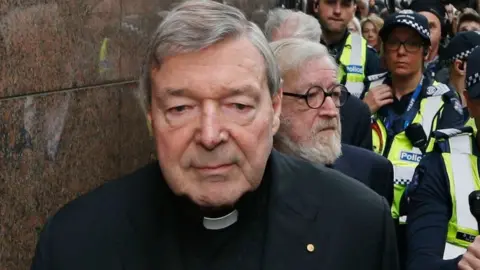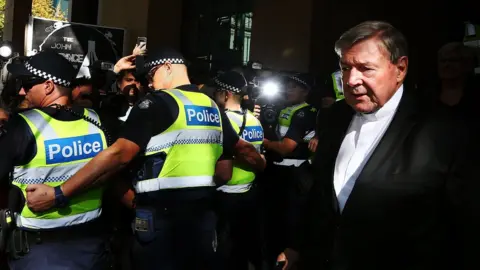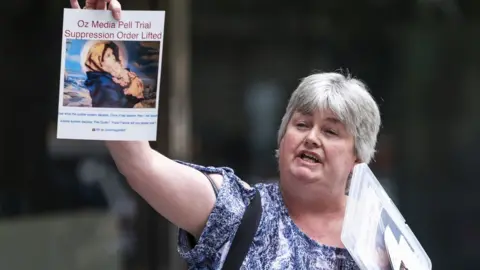George Pell: Why was conviction kept secret?
 Getty Images
Getty ImagesThey were sex abuse allegations that rocked the Catholic Church and generated enormous interest - only for the case to vanish suddenly from public view for nine months.
The trial and conviction of Cardinal George Pell can now be reported after an Australian judge lifted a legal order that had prohibited coverage.
The sweeping ban, known as a suppression order, was handed down last May.
It was deemed necessary to give Pell fair hearings but caused big debate.
The rationale for the ban
Police charged Pell with sex offences in June 2017, saying only that he faced "historical" allegations by "multiple complainants". The cardinal immediately denied any wrongdoing.
Some pre-trial hearings where Pell was swamped by media outside court were allowed to be reported.
Those hearings revealed for the first time that Pell faced separate accusations from the 1990s and the 1970s. Consequently, a judge ordered that two trials - with separate juries - would take place.
 Getty Images
Getty ImagesIn a bid to prevent the first trial influencing the second, the judge agreed to an immediate suppression order.
It made it illegal to report that any trial was taking place. Even saying that the suppression order existed was prohibited. It allowed reporting that Pell was facing abuse allegations, but nothing more specific.
The legal order legally applied only to Australia. But it effectively extended to international media which publish or broadcast into Australia, or can be accessed there, a tough thing to avoid in the internet age.
Did everyone follow the rules?
That may be subject to legal debate but the judge expressed fury about some reporting.
Australian outlets were generally most cautious, with journalists sitting in regularly on Pell's case and adhering to the ban.
The blackout did not go totally unnoticed publicly. Social media users, for instance, frequently speculated about it.
But matters escalated dramatically in December when numerous non-Australian outlets published stories reporting that Pell had been convicted. The words "George Pell" were soon trending online, including in Australia.
 EPA
EPAIt prompted some of Australia's biggest newspapers to run front-page editorials criticising the suppression order. Unlike overseas media, they did not name Pell.
"The world is reading a very important story that is relevant to Victorians," wrote Melbourne's Herald Sun, below a headline "CENSORED".
"The Herald Sun is prevented from publishing details of this significant news. But trust us. It's a story you deserve to read."
Sydney's Daily Telegraph described it as the nation's biggest story, and wrote: "An awful crime. The person is guilty. Yet we can't publish it."
Melbourne newspaper The Age and other publications also published articles, some giving details of the case.
In a specially convened court hearing on 13 December, Judge Peter Kidd said he was "angry" about media reports though he did not mention specific outlets.
"Given how potentially egregious and flagrant these breaches are, a number of very important people in the media are facing, if found guilty, the prospect of imprisonment and indeed substantial imprisonment," he told lawyers for the prosecution and defence.
The judge left the matter with prosecutors to investigate. Digital versions of some front pages were later unavailable.
Allow X content?

Other Australian journalists, however, voiced support for the suppression order, expressing concerns that publicity could influence a court outcome.
Allow X content?

So was the ban effective?
Some say it was not but others disagree, arguing that most people did not know about Pell's conviction before Tuesday.
And, ultimately, his second trial will not proceed. On Tuesday, prosecutors withdrew the charges relating to the 1970s.
Lawyer Justin Quill, whose firm is acting on behalf of local media outlets, argued that judges needed to "have more faith" in jurors to form their view from a courtroom even if they had seen something related to the case on social media.
"For the public to not be told [about Pell's conviction] until nearly three months later is, in my view, a situation that is not appropriate," he told the BBC.
He also said courts could not "go around charging 10,000 people for one or two comments they've made on Twitter", adding: "Mainstream media is being held to one standard, and the general public is being held to another - it just doesn't make sense."
'The Suppression State'
Suppression orders are common in Australia unlike in other countries such as the US.
But the state of Victoria in particular has come in for criticism, accounting for more than half of the country's orders, local media reports. Critics sometimes deride it as "The Suppression State".
Allow X content?

State Premier Daniel Andrews has vowed to implement 18 recommendations from a review by a retired judge that called for a "real-world" approach to suppression orders, given how quickly information can be spread online.
"This is about making sure the laws relating to contempt of court and suppression orders are working effectively by protecting victims, but also the public's right to know as well as court processes," state Attorney General Martin Pakula said in October.
